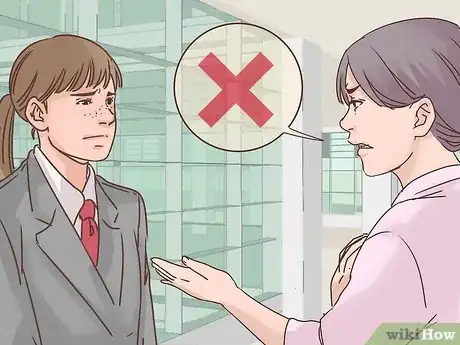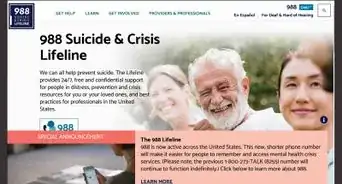This article was co-authored by Tracy Carver, PhD. Dr. Tracy Carver is an award-winning Licensed Psychologist based in Austin, Texas. Dr. Carver specializes in counseling for issues related to self-esteem, anxiety, depression, and psychedelic integration. She holds a BS in Psychology from Virginia Commonwealth University, an MA in Educational Psychology, and a Ph.D. in Counseling Psychology from The University of Texas at Austin. Dr. Carver also completed an internship in Clinical Psychology through Harvard University Medical School. She was voted one of the Best Mental Health Professionals in Austin for four years in a row by Austin Fit Magazine. Dr. Carver has been featured in Austin Monthly, Austin Woman Magazine, Life in Travis Heights, and KVUE (the Austin affiliate for ABC News).
There are 8 references cited in this article, which can be found at the bottom of the page.
This article has been viewed 12,789 times.
Admitting you need mental health treatment takes courage, but so does telling someone they should get help. Sitting by and watching your friend suffer is heart-breaking, but the thought of confronting them about their issue may be more than you think you can take. But you can do it and possibly convince your friend to seek professional help by preparing ahead of time, saying the right things, and offering support.
Steps
Preparing Ahead of Time
-
1Ask your friend questions. The best way to help your friend is to gain a better understanding of what they are going through. Sit down and gently bring up the topic about your friend's mental health. Ask questions to learn more about what they might need.
- You might say, "You haven't seemed like yourself lately. Is everything okay?" Stick to what you have observed and avoid making assumptions. You may bring in other people’s observations if needed. This may also be a good time to ask, “Have you thought about going to talk to somebody about that?”
- This offers a great benchmark for bringing up the subject later when you have done some research or looked up possible counselors.
-
2Research your friend’s symptoms. After you have gotten some cursory information about what kind of problems they might be experiencing, research the person’s symptoms and the type of treatment that may benefit them. This way, when you suggest they seek help, you know exactly what type of treatment to talk about.
- Also, providing a possible name to what your friend is experiencing may give them a sense of hope that they can get better.
- Print out the symptoms of the condition you believe your friend may be suffering from and let them see. Having this type of evidence may convince them that they need help.[1]
Advertisement -
3Anticipate rejection or rebuttals. No matter how much you do to plan out the conversation, it may not go the way you want. Your friend may become angry with you and not want to see you again. However, you are doing the right thing by trying to help, no matter how they may see it at the time.
- Go into the conversation knowing full well that your friend may deny that anything is wrong with them, yell at you, ask you to leave, and threaten to end your friendship. Walking in with the worst-case scenario already in your head may better prepare you for it, if it happens.[2]
- If your friend does resist you, don't push them. If they're not ready for therapy, it's not going to be helpful for them right now. Let them come to it on their own.[3]
-
4Choose the appropriate time and location. Talking to your friend about their mental health is typically something that should be done one-on-one.
Attempting to have the conversation when they’re preoccupied won’t go over well, as your friend won’t be able to give their full attention to you and what you’re saying.
Instead, choose a time and place where your friend feels comfortable and will be able to understand your message.
If possible, avoid having the talk when your friend is going through a difficult or stressful time. Attempting to persuade them when they are in distress will usually end in failure.[4] -
5Be respectful of your friend's right to choose. Despite your best efforts, you have to accept that you can't force your friend to get help. Bring up the subject and tell them you are worried, but know that you cannot dictate whether your friend gets help or not.
- Keep the lines of communication open and let your friend know that they can talk to you any time if they change their mind.
-
6Ask for help. If you think your friend won’t take your word alone, ask for support from other friends and loved ones. Or, if you think your friend will be more likely to listen to someone else, then consider having that person talk to them instead of you.
Having more than just your opinion may make your case more substantial and they may take the talk more seriously. You may also want to ask a professional to sit in on the conversation to help steer it the proper way.
When asking for support, you could say, “I’m concerned about our friend and I know they value your opinion and trust you. I was hoping you could talk to them about getting help with me. I think if you share your concern for them, they’ll take it more seriously.”[5]- Again, keep in mind that your friend may not feel comfortable with you involving others. Only do this if you believe your friend is in danger of hurting themselves or someone else.
Saying the Right Things
-
1Avoid putting the blame on them. Walking into a conversation and saying, “You’re depressed and need help” is going to make anyone defensive. Instead, put the focus on yourself and how you’re feeling. The person may not get combative with you if you make the topic more about you.
- For example, you could say, “I’m really concerned that you may be struggling with depression. I’ve noticed certain behaviors in you and I think it would be helpful if you could talk to a professional. Could you do that for me?”[6]
-
2Don’t use labels. No one wants to hear there is something wrong with them. It can become particularly hurtful when negative words are used to describe them. Never use a label when talking to your friend; doing so can make them reject everything you are trying to say.
- For instance, never say the person is “crazy” or a “lunatic.” They might even say something like, “You think I’m crazy,” and it is important to let them know that you absolutely do not think that. Similarly, don’t call your friend a “drunk” or a “druggie.” Instead, you could say they haven’t been acting like themselves, or you feel like they’ve been indulging in alcohol or drugs excessively.[7]
-
3Be supportive in what you say. The point of the meeting is to encourage your friend to get help. If you let them know you will be with them every step of the way, they are more likely to seek treatment and try to get better.
Thinking that they will have to deal with this alone may make them more afraid and reluctant to seek help.
Be sure to let your friend know that you are not trying to take over their pursuit of treatment, but that you are trying to help make it easier for them to get treatment. Ask what you can do to help.
If you've been to therapy before, it can be really helpful if you share your experiences of how it's helped you.[8]
One way to show your support is to lead by example. If you want your friend to stop drinking, then stop drinking yourself. Using the “Do as I say, not as I do” approach won’t work here. By bettering yourself, you may encourage them to get the help they need, too.[9]
Offering Support
-
1Help when you can. Your friend may be reluctant to go therapy because of logistical reasons like lacking transportation or not being able to afford the fees. Offer to help them arrange transportation when you aren’t able to provide it.
If you can, help to pay for the sessions and medications they may need. Or, help them research community programs that offer low-cost or free services to individuals in need.
If you can’t drive them, consider calling a taxi or ride service to get them there. Your support and willingness to make their health a priority can give them the boost they need to get better.
Be sure to ask your friend before you make these kinds of arrangements for them. Let them know that you only want to help make it easier for them to seek treatment, but that you do not want to take away their control. -
2Attend appointments together. Your friend may be worried about what the appointments will be like, particularly if they suffer from anxiety or depression. Offering to go to therapy with them or sit next to them during a support group meeting may make the thought of going there easier to fathom.
Knowing that you will be with them every step of the way may encourage them to take their mental health more seriously.
You may only need to attend the first appointment or two until your friend becomes comfortable. After that, your friend may prefer to attend alone. Don’t take this as an insult. Look at it as a big step in their improvement.[10]- Be respectful of your friend’s privacy regarding these appointments as well. Your friend may not want you there or they might not want to talk about the appointment at all.
-
3Do the leg work for them. If your friend is skeptical about seeking therapy, they likely aren’t going to be excited about finding a doctor and making the appointments.
It would probably be a big help if you do that part for them. They may already feel overwhelmed about the process, and having to research and do the other steps may make them even more so.
If you make an appointment for your friend and they back out, attend the session anyways. You can talk to the therapist about your friend and they may be able to offer suggestions on how to help your friend cope with their condition and how you may be able to convince them to attend therapy.
Only schedule appointments if your friend agrees to see a therapist. Your friend may feel violated if you go behind their back. Ask them if they want your help first. -
4Stick up for your friend when they need it. Mental health still carries a big stigma with it. This negativity could play a role in how willing your friend is to attend therapy.
Offer to help your friend talk to their other friends and family members if they need help explaining why they are going to therapy, or if the people around them are giving them a hard time about their illness.
It is especially important to do this right when the comment has been made. Let your friend hear you stand up for them.
You could say to their family, “It would be great if everyone could offer the support and encouragement needed to help our loved one get better.”
If someone says something negative about your friend, you can tell them, “I think it’s really courageous that they understood there was a problem and are taking the steps to get better. If you can’t be supportive of that, please keep your thoughts to yourself, or perhaps stay away.”[11] -
5Look after your own mental health. You can suggest that your friend see a therapist, but you can't play the role for them. Helping a mentally ill or unstable friend can be taxing. Don't bite off more than you can chew. And, be sure to tend to your own mental and emotional well-being. Set personal boundaries.
- For example, take at least one night off a week to do things you enjoy such as taking a relaxing bubble bath or seeing a movie at the cinema. Tell your friend they won't be able to reach you. Be sure to give them another number they can call in case of emergencies, like another friend, relative, or crisis hotline.
- Be aware of codependent behaviors as well. As you are helping your friend, it is possible to fall into a pattern where you are enabling them.
Expert Q&A
Did you know you can get expert answers for this article?
Unlock expert answers by supporting wikiHow
-
QuestionShould you force someone to go to therapy?
 Tracy Carver, PhDDr. Tracy Carver is an award-winning Licensed Psychologist based in Austin, Texas. Dr. Carver specializes in counseling for issues related to self-esteem, anxiety, depression, and psychedelic integration. She holds a BS in Psychology from Virginia Commonwealth University, an MA in Educational Psychology, and a Ph.D. in Counseling Psychology from The University of Texas at Austin. Dr. Carver also completed an internship in Clinical Psychology through Harvard University Medical School. She was voted one of the Best Mental Health Professionals in Austin for four years in a row by Austin Fit Magazine. Dr. Carver has been featured in Austin Monthly, Austin Woman Magazine, Life in Travis Heights, and KVUE (the Austin affiliate for ABC News).
Tracy Carver, PhDDr. Tracy Carver is an award-winning Licensed Psychologist based in Austin, Texas. Dr. Carver specializes in counseling for issues related to self-esteem, anxiety, depression, and psychedelic integration. She holds a BS in Psychology from Virginia Commonwealth University, an MA in Educational Psychology, and a Ph.D. in Counseling Psychology from The University of Texas at Austin. Dr. Carver also completed an internship in Clinical Psychology through Harvard University Medical School. She was voted one of the Best Mental Health Professionals in Austin for four years in a row by Austin Fit Magazine. Dr. Carver has been featured in Austin Monthly, Austin Woman Magazine, Life in Travis Heights, and KVUE (the Austin affiliate for ABC News).
Licensed Psychologist
-
QuestionHow do I choose a therapist for someone else?
 Tracy Carver, PhDDr. Tracy Carver is an award-winning Licensed Psychologist based in Austin, Texas. Dr. Carver specializes in counseling for issues related to self-esteem, anxiety, depression, and psychedelic integration. She holds a BS in Psychology from Virginia Commonwealth University, an MA in Educational Psychology, and a Ph.D. in Counseling Psychology from The University of Texas at Austin. Dr. Carver also completed an internship in Clinical Psychology through Harvard University Medical School. She was voted one of the Best Mental Health Professionals in Austin for four years in a row by Austin Fit Magazine. Dr. Carver has been featured in Austin Monthly, Austin Woman Magazine, Life in Travis Heights, and KVUE (the Austin affiliate for ABC News).
Tracy Carver, PhDDr. Tracy Carver is an award-winning Licensed Psychologist based in Austin, Texas. Dr. Carver specializes in counseling for issues related to self-esteem, anxiety, depression, and psychedelic integration. She holds a BS in Psychology from Virginia Commonwealth University, an MA in Educational Psychology, and a Ph.D. in Counseling Psychology from The University of Texas at Austin. Dr. Carver also completed an internship in Clinical Psychology through Harvard University Medical School. She was voted one of the Best Mental Health Professionals in Austin for four years in a row by Austin Fit Magazine. Dr. Carver has been featured in Austin Monthly, Austin Woman Magazine, Life in Travis Heights, and KVUE (the Austin affiliate for ABC News).
Licensed Psychologist
-
QuestionHow do you convince someone to go to therapy?
 Tracy Carver, PhDDr. Tracy Carver is an award-winning Licensed Psychologist based in Austin, Texas. Dr. Carver specializes in counseling for issues related to self-esteem, anxiety, depression, and psychedelic integration. She holds a BS in Psychology from Virginia Commonwealth University, an MA in Educational Psychology, and a Ph.D. in Counseling Psychology from The University of Texas at Austin. Dr. Carver also completed an internship in Clinical Psychology through Harvard University Medical School. She was voted one of the Best Mental Health Professionals in Austin for four years in a row by Austin Fit Magazine. Dr. Carver has been featured in Austin Monthly, Austin Woman Magazine, Life in Travis Heights, and KVUE (the Austin affiliate for ABC News).
Tracy Carver, PhDDr. Tracy Carver is an award-winning Licensed Psychologist based in Austin, Texas. Dr. Carver specializes in counseling for issues related to self-esteem, anxiety, depression, and psychedelic integration. She holds a BS in Psychology from Virginia Commonwealth University, an MA in Educational Psychology, and a Ph.D. in Counseling Psychology from The University of Texas at Austin. Dr. Carver also completed an internship in Clinical Psychology through Harvard University Medical School. She was voted one of the Best Mental Health Professionals in Austin for four years in a row by Austin Fit Magazine. Dr. Carver has been featured in Austin Monthly, Austin Woman Magazine, Life in Travis Heights, and KVUE (the Austin affiliate for ABC News).
Licensed Psychologist
References
- ↑ http://www.quickanddirtytips.com/health-fitness/mental-health/how-to-encourage-someone-to-go-to-therapy?page=1
- ↑ http://lifehacker.com/how-do-i-persuade-someone-to-seek-professional-help-1590450689
- ↑ Tracy Carver, PhD. Licensed Psychologist. Expert Interview. 7 January 2021.
- ↑ https://psychcentral.com/blog/archives/2012/10/01/how-to-persuade-your-loved-one-to-seek-professional-help/
- ↑ https://www.mentalhealth.gov/talk/friends-family-members/
- ↑ https://www.psychologytoday.com/blog/struck-living/201110/convincing-the-stubborn-accept-mental-health-care
- ↑ http://www.webmd.com/depression/getting-help-for-someone-you-think-is-depressed
- ↑ Tracy Carver, PhD. Licensed Psychologist. Expert Interview. 7 January 2021.
- ↑ https://www.helpguide.org/articles/depression/helping-a-depressed-person.htm









































































